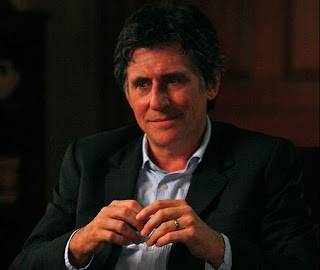
As the smoke and ash were still rising from the felled twin towers, reports began to surface that certain of the 9/11 hijackers had visited a strip club in Florida while here training to be pilots.
Just how credible such reports are—or the numerous other terrorist “sightings” that began to flood in during the aftermath of that devastating September day—has oft been debated. Did men claiming to be holy warriors attacking America for, among other things, their ideas of “impurity” and “sin” drink and gamble and get lap dances and attempt to hire prostitutes?
That humans don’t live up to what we claim to stand for, that we are able to justify and rationalize—sometimes to a pathological degree—is the stuff dreams are made of. And what is fiction if not a kind of twilight between waking and sleep where elements from both worlds intertwine and form narrative?
In “The Garden of Last Days” Andre Dubus III dreams of the intersection where a Florida stripper and a 9/11 highjacker meet, exploring them and the people around them in the way only a novelist can.
From the book jacket:
“One early September night in Florida, a stripper brings her daughter to work.
April's usual babysitter, Jean, has had a panic attack that has landed her in the hospital. April doesn't really know anyone else, so she decides it's best to have her three-year-old daughter close by, watching children's videos in the office while she works.
April works at the Puma Club for Men. And tonight she has an unusual client, a foreigner both remote and too personal, and free with his money. Lots of it, all cash. His name is Bassam. Meanwhile, another man, AJ, has been thrown out of the club for holding hands with his favorite stripper, and he's drunk and angry and lonely. From these elements comes a relentless, searing, page-turning narrative—a big-hearted and painful novel about sex and parenthood and honor and masculinity.”
Why people do the things we do is endlessly fascinating, and fiction is a great place to explore motivation. Like us, characters, particularly the less thoughtful and insightful ones, are often not aware of motives, and even those of us who continually examine what we do and why we do it, never fully understand. People are complex—some far more than others. We rarely realize the degree to which our culture and family and flawed programming and perceptions determine who we are and what we do.
Though “The Garden of Last Days” doesn’t attempt to explain them, it does at least raise the questions: What makes someone rigid? Fundamentalist? Terrorist? What causes someone to become a stripper? What causes people to frequent strip clubs? What causes a man to hit a woman? Why are some people kind, others cruel? Why do some people spread love and goodness, others judgment, discord, pain?
There’s no one answer to any of these questions. Motivation is a mystery. Psychology, theology, sociology, philosophy, biology can only tell us so much.
You and I could be next to each other doing nearly the exact same activity for motivations that are nearly antithetical to each other. No two strippers have the same motivation any more than any two writers or teachers or bartenders or ministers or counselors. Sure, many people are motivated by money—too many and too motivated—but there are always other ways to farm for lettuce, and they’re often easier and more profitable. Why do we choose the ones we do?
As a mom, April is flawed, sure—who isn’t?—but she does far less damage than nearly all the people judging her.
In an interview for “The Garden of Last Days,” Dubus said that when he writes, he suspends all judgment and just seeks to understand his characters, that when he’s writing, he’s a better man than when he’s not writing. What if we all did this all the time? Realized that people are complicated and there’s a context, an explanation for why they do what they do that we can’t understand? What if we loved ourselves in spite of our faults and failures and loved others regardless of theirs? It’s not impossible—this concept of loving God, loving ourselves, and loving others as ourselves. Unconditional love is what we all need—to give and receive. Compassion is what’s called for, empathy, understanding, insight—and reading good books with an open heart and mind is a great way to start.
I have friends who are strippers and friends who are Fundamentalists—both groups to various degrees are being exploited by men, and though I personally like and enjoy the company of the former group much more than the latter, both need and are worthy of love and understanding.
What we’re all in search of is connection—is love and understanding, which is far too rare and difficult to find, and why people turn to the substitutes of Fundamentalism and sexual and social surrogacy. Fundamentalists of every religion (including atheism) are told they can belong to the group and get the acceptance from others and ultimately God if they follow the group’s rules. Sexual and social surrogates give the friend or girlfriend experience for money (among other things—see above people are complicated). But all are poor substitutes for genuine, deep connection, nonjudgmental acceptance, and unconditional love—of course, most of the things in our lives are.



















